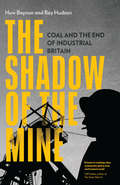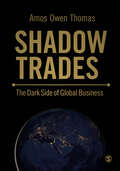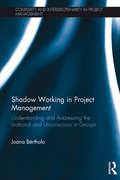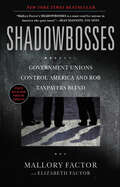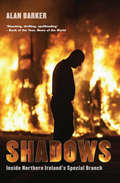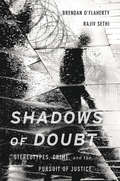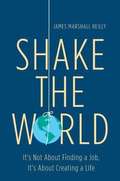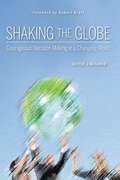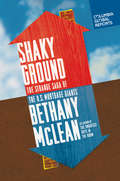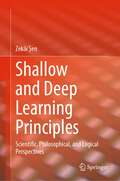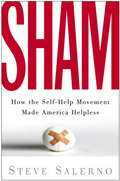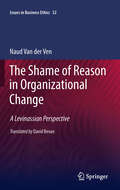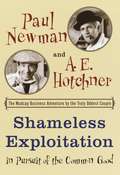- Table View
- List View
The Shadow of the Mine: Coal and the End of Industrial Britain
by Ray Hudson Huw BeynonThe rise and fall of Britain's most important industryNo one personified the age of industry more than the miners. The Shadow of the Mine tells the story of King Coal in its heyday - and what happened to mining communities after the last pits closed.Coal was central to the British economy, powering its factories and railways. It carried political weight, too. In the eighties the miners risked everything in a year-long strike against Thatcher's shutdowns. Defeat foretold the death of their industry. Tens of thousands were cast onto the labour market with a minimum amount of advice and support.Yet British politics all of a sudden revolves around the coalfield constituencies that lent their votes to Boris Johnson's Conservatives in 2019. Even in the Welsh Valleys, where the 'red wall' still stands, support for the Labour Party has halved in a generation. Huw Beynon and Ray Hudson draw on decades of research to chronicle these momentous changes through the words of the people who lived through them.
The Shadow Party: How George Soros, Hillary Clinton, and Sixties Radicals Seized Control of the Democratic Party
by Richard Poe David HorowitzAmerica is under attack. Its institutions and values are under daily assault. But the principal culprits are not foreign terrorists. They are influential and powerful Americans secretly stirring up disunion and disloyalty in the shifting shadows of the Democratic Party. New York Times best-selling authors David Horowitz and Richard Poe (both former radicals) weave together riveting history, investigative reporting, and cutting political analysis to help expose and explain: The Shadow Party's plan to rewrite the US Constitution. How the Shadow Party overthrows foreign governments - and why it may attempt to use the same methods here. The vast network of private think tanks, foundations, unions, stealth PACs, and other front groups through which the Shadow Party operates in America. The network's voluminous contributions to the Democrats, which totaled more than $300 million in the 2004 elections, and its growing influence over the party's message and policy. The politicians on both sides of the aisle who have exchanged political favors with George Soros and his "government-in-the-wings. " The Shadow Party's efforts to conceal its radical agenda behind the "moderate" pose of Hillary Clinton and other public figures. The radical network's plan to seize power in 2008.
Shadow Trades: The Dark Side of Global Business
by Amos Owen ThomasAlongside burgeoning global business, which asserts its legality, ethics and social responsibility, there exists a dark side of shadow trades manifesting various shades of legitimacy. Not only do the latter’s corrupt practices, dubious supply chains and other illicit operations run in tandem with global business, these borderless trades intersect with economic structures and contribute to systems adopted by corporations, endorsed by neoliberal capitalism, that are often condoned by governments and unwittingly sustained by consumers. In a very real sense, all of us may be implicated in shadow trades through our work, consumption and citizenship. Even before we can begin to confront and constrain shadow trades, their business models first need to be identified and analysed in all their networked complexity, interconnectivity with global business and embeddedness within the world economy. Numerous hard questions need to be raised around enabling circumstances and responsibilities of stakeholders, as well as the winners and losers resulting from business globalisation and socio-economic inequities within and between countries. Providing background, evidence and analysis on select exemplars of shadow trades, this book provides graduate students of business, plus scholars in the social sciences, together with practitioners and policymakers, consumer groups and civil society, with an indispensable resource for critical engagement. Only through knowledge gained by research and advocacy for transparency can we begin to shed light on this dark side of global business, enabling all of us to grapple with activism against and collaborative action towards undermining all shadow trades. Amos Owen Thomas was a Docent / Reader in Marketing and International Business at Stockholm University until his recent retirement
Shadow Trades: The Dark Side of Global Business
by Amos Owen ThomasAlongside burgeoning global business, which asserts its legality, ethics and social responsibility, there exists a dark side of shadow trades manifesting various shades of legitimacy. Not only do the latter’s corrupt practices, dubious supply chains and other illicit operations run in tandem with global business, these borderless trades intersect with economic structures and contribute to systems adopted by corporations, endorsed by neoliberal capitalism, that are often condoned by governments and unwittingly sustained by consumers. In a very real sense, all of us may be implicated in shadow trades through our work, consumption and citizenship. Even before we can begin to confront and constrain shadow trades, their business models first need to be identified and analysed in all their networked complexity, interconnectivity with global business and embeddedness within the world economy. Numerous hard questions need to be raised around enabling circumstances and responsibilities of stakeholders, as well as the winners and losers resulting from business globalisation and socio-economic inequities within and between countries. Providing background, evidence and analysis on select exemplars of shadow trades, this book provides graduate students of business, plus scholars in the social sciences, together with practitioners and policymakers, consumer groups and civil society, with an indispensable resource for critical engagement. Only through knowledge gained by research and advocacy for transparency can we begin to shed light on this dark side of global business, enabling all of us to grapple with activism against and collaborative action towards undermining all shadow trades. Amos Owen Thomas was a Docent / Reader in Marketing and International Business at Stockholm University until his recent retirement
Shadow Vigilantes: How Distrust In The Justice System Breeds A New Kind Of Lawlessness
by Paul H. Robinson Sarah M. RobinsonA form of subtle vigilantism threatens to undermine the justice system and is eroding community trust in law enforcement.A pervasive and destructive problem is afflicting our current justice system, eroding community confidence in law enforcement. "Shadow vigilantism" is a vicious cycle in which ordinary people, as well as criminal justice officials, are so fed up with the system's failures that they distort and subvert the system to force it to do the justice that it seems reluctant to do on its own. The effects of this lack of trust are pervasive and pernicious: citizens refuse to report a crime or help investigators; jurors refuse to indict or convict; and officials manipulate a system that is perceived to be unreliable. This downward spiral eventually undermines the moral authority of law enforcement and creates widening rifts in the community.This book examines many examples of how the community has responded when the justice system is perceived to fail, including the infamous murder of Emmett Till, which became a cause that spurred on the NAACP and the civil rights movement; the Lavender Panthers, which formed in response to gay bashing during the 1980s; the Crown Heights Maccabees, a neighborhood watch group that successfully reduced neighborhood crime when the police failed to do so; the Animal Liberation Front, which struck back at institutions for perceived abuses to animals; Operation Perverted Justice, an organization that used online chat rooms to out pedophiles by publicizing their personal information; and many others.Such examples highlight the importance of upholding a justice system that works to provide justice for all and is not perceived to condone legal technicalities that overturn just punishment, judicial rules that suppress evidence and let serious offenders go, and other actions that undermine public trust in the system.
Shadow Working in Project Management: Understanding and Addressing the Irrational and Unconscious in Groups (Complexity and Interdisciplinarity in Project Management)
by Joana BértholoShadow Working in Project Management aims at contributing to our knowledge of all things unconscious and irrational in our behaviour. It takes the form of an empirical research, and therefore addresses mostly the tools and techniques available to get in touch with Shadow aspects of self and collective, to recognize how it manifests, how it can lead to conflict, and ways to address it. From that perspective, it advances on to question the underlying beliefs of current management practices. It explores as well the inherent need for control in projects, being those of a professional nature, or other ventures. It challenges the strength of the concept of the "rational man" and its protagonism. Joana Bértholo’s work explores the role and nature of the Shadow in the context of projects and their management, with an emphasis on techniques to address it. Despite being directed to managers and dedicated to the analyses of the managerial discourse, the tools and processes it proposes have universal relevance, based on the fact that the Shadow is everywhere, within everyone, from the individual to the global scale.
Shadowbosses: Government Unions Control America and Rob Taxpayers Blind
by Mallory Factor Elizabeth FactorSHADOWBOSSES reads like an organized crime novel, but it's actually a true story of how labor unions are infiltrating our government and corrupting our political process. This compelling and insightful book exposes how unions have organized federal, state, and local government employees without their consent, and how government employee unions are now a threat to our workers' freedoms, our free and fair elections, and even our American way of life. And, Mallory Factor reveals what's coming next: how unions are targeting millions of Americans--maybe even you--for forced unionization so that unions can collect billions more in forced dues and exert an even greater influence over American politics. A chilling expose, SHADOWBOSSES is also a call to citizen action against those who really hold power in America today.
Shadows: Inside Northern Ireland's Special Branch
by Alan BarkerIn the early hours of 30 April 2003, twelve armed and uniformed officers accompanied by four plain-clothes detectives burst into Alan Barker's house. They stayed for hours, turning over rooms, seizing documents, impounding computers, files and anything else that interested them. The family were treated as terrorist suspects, the operation resembling so many others in Northern Ireland during the Troubles. But Alan Barker was and is no terrorist. In fact, he has spent his adult life fighting terrorism on the streets of his native province. Barker belonged to the Special Branch, the RUC's elite unit dedicated to fighting the IRA, the INLA and loyalist terrorists. He gives a gripping insider's account of life on the frontline and demonstrates how the RUC used sophisticated listening devices and informants, including the notorious supergrass Raymond Gilmour, in their fight to gain the upper hand. After nearly 30 years of loyal service, Barker retired angry and disillusioned about what he views as the government's capitulation to the terrorists. This is the book that Downing Street and the Northern Ireland Office don't want you to read. It is a story of courage under fire, guile, Le Carré-esque plots and treachery.
Shadows of Doubt: Stereotypes, Crime, and the Pursuit of Justice
by Brendan O'Flaherty Rajiv SethiCrime and punishment occur under extreme uncertainty. Offenders, victims, police, judges, and jurors make high-stakes decisions with limited information under severe time pressure. With compelling stories and data on how people act and react, O’Flaherty and Sethi reveal the extent to which we rely on stereotypes as shortcuts in our decision making.
Shady Trail
by Arthur I SegelHolt Lunsford was intrigued by the packet of papers that lay in front of him. The papers comprised a brochure that Lonestar Bank had put together in an effort to sell the Shady Trail Distribution Center in Dallas, Texas. Shady Hill was a five-year-old, 120,000-square-foot distribution warehouse facility located on the west side of Dallas. Lonestar was asking $4 million for the property. It was September 2003 and the Dallas real estate market was plateauing and the capital markets were in disarray. Lunsford had convinced 11 friends to put up $100,000 each in addition to his own $100,000 to acquire one or two troubled properties. Lunsford decided to focus on warehouse properties due to their relatively small size, their strong historical performance, and his relevant experience. He wondered whether Shady Trail would make a good investment.
Shake Shack: Recipes and Stories
by Mark Rosati Randy GaruttiShake Shack's first-ever cookbook, with 70 recipes and plenty of stories, fun facts, and pro tips for the home cook and ShackFan, as well as 200 photographs.Follow Shake Shack's journey around the world; make your own ShackBurgers, crinkle-cut fries, and hand-spun frozen custard shakes at home; and get a glimpse into the culture, community, and inner workings of this global phenomenon.
Shake the World: It's Not About Finding a Job, It's About Creating a Life
by James Marshall ReillyJames Marshall Reilly set out to capture the insights of today's brightest business and nonprofit leaders. He conducted in-depth interviews with Tony Hsieh (Zappos), Blake Mycoskie (TOMS), Shawn Fanning (Napster, Rupture, Path), and Jessica Jackley (Kiva, ProFounder), among many others. And he learned that despite their different fields, they're all using similar tools to seize opportunities and redefine success. Embracing a shift in generational values, these young people share a passion for driving powerful global change while creating sustainable organizations that often blur the old boundaries between business and philanthropy. To really "make it" these days, according to Reilly, you need to break the old corporate mold, ignore the "rules," and create your own opportunities. The true game changers are the men and women starting their own businesses, inventing jobs that didn't previously exist, and committing themselves fully to attaining astonishing success, however individually defined. Shake the World reveals the meteoric rise (and the occasional stumbles) of a new generation of business leaders. Reilly brings their stories to life and, along the way, offers clear lessons that you can apply to your own pursuits. For example, you'll learn firsthand how: Doug Ulman followed his passions to become CEO of LIVESTRONG. Blake Mycoskie of TOMS responded to ordinary events in an extraordinary way and created a sustainable organization that changed the face of giving and the lives of millions. Bobby Chang used counterintuitive thinking to build the global brand Incase and applies the same techniques to problem solving in everyday life. Jessica Jackley of Kiva and ProFounder harnessed technology in unprecedented ways to build a powerful network and enact palpable, transformational change. Elizabeth Gore took a small risk during college that altered the trajectory of her life and ultimately led her to become the executive director of global partnerships at the UN Foundation. The role models in Shake the World define themselves not by money and title but by fulfillment and happiness. This book will light your path to greatness if you too want to shake the world. This is not just a book about finding a job. It's a book about creating an inspired life. .
Shaking the Globe
by Robert Kraft Blythe J. McgarvieWe live in a highly interdependent world where 95 percent of the world's consumers live outside the U.S. Two-thirds of the world's purchasing power is also outside the U.S. Shaking the Globe guides everyone on how to absorb the world's diversity and to build upon his or her global citizenship by using the FISO Factor? skills to transform themselves from a conventional leader into a courageous one.The new dynamics of global leadership--developing different competencies, curiosity and caring--must be learned. Shaking the Globe introduces the newly developed FISO Factor? Assessment Tool that can be used to evaluate a leader's ability to both Fit In and Stand Out - the ingredients necessary for leaders to make differences in their lives. Globalization is happening with or without you. To be a leader, you must learn how to take advantage of this opportunity. In this book, you will learn:How to transcend any existing biases and prepare for the new world in order to keep your business growing;Strategies to develop transformational global leadership skills in order to establish beachheads for future growth opportunities; andHow to stimulate coordination and cooperation across national borders in order to create a lasting and rewarding relationship with people with whom you will be connected.
Shaklee Corporation: Corporate Social Responsibility
by Alison Comings Christopher Marquis V. Kasturi RanganHaving bought Shaklee Corporation from Yamanouchi, Roger Barnett, its owner and CEO, wrestled with the question of how to grow the company and its reputation for environmental sustainability. In addition to preserving the "network marketing" nature of its sales channel (because it creates jobs and entrepreneurs), Barnett wished to take the business model to sub-Saharan Africa and South Asia.
Shaklee Corporation: Corporate Social Responsibility
by Alison Comings Christopher Marquis V. Kasturi RanganHaving bought Shaklee Corporation from Yamanouchi, Roger Barnett, its owner and CEO, wrestled with the question of how to grow the company and its reputation for environmental sustainability. In addition to preserving the "network marketing" nature of its sales channel (because it creates jobs and entrepreneurs), Barnett wished to take the business model to sub-Saharan Africa and South Asia.
Shaky Ground
by Bethany McleanIn a way, the situation is ironic: housing was at the root of the financial crisis, and six years after the meltdown, housing finance is still the greatest unsolved issue. The U.S. housing market is roughly $10 trillion, making it one of the largest segments of the bond market. Roughly 70 percent of the American population has a mortgage, and for most people, the mortgage is the most important financial instrument in their lives. But until the financial crisis, few people knew the essential role that Fannie Mae and Freddie Mac play in their mortgages. Given the $188 billion government bailout of the two firms - the most expensive bailout in history - the politics surrounding housing are worse than they've ever been, and the two gigantic firms sit in limbo. Best-selling investigative journalist Bethany McLean, the coauthor of The Smartest Guys in the Room and All the Devils Are Here, explains why the situation is dangerous and unsustainable, and proposes a few solutions - from the perfect, but politically unfeasible to the doable, but ugly.
Shale Energy Revolution: The Rise and Fall of Global Oil and Gas Industry
by Binlei GongThis book answers the following questions: How will the global oil and gas market change in the next decade? How does the United States become the world's biggest oil and gas producer? What is the current condition of China's Shale Industry and energy security? Is hydraulic fracturing and horizontal drilling technology cheered or feared? Is energy production driven by economy or environment? Who are the major competitors in this market? This book covers not only macro analysis at country-level, but also micro analysis at firm-level, which helps investigate this industry more comprehensively.
Shallow and Deep Learning Principles: Scientific, Philosophical, and Logical Perspectives
by Zekâi ŞenThis book discusses Artificial Neural Networks (ANN) and their ability to predict outcomes using deep and shallow learning principles. The author first describes ANN implementation, consisting of at least three layers that must be established together with cells, one of which is input, the other is output, and the third is a hidden (intermediate) layer. For this, the author states, it is necessary to develop an architecture that will not model mathematical rules but only the action and response variables that control the event and the reactions that may occur within it. The book explains the reasons and necessity of each ANN model, considering the similarity to the previous methods and the philosophical - logical rules.
Sham: How the Self-Help Movement Made America Helpless
by Steve SalernoSelf-help: To millions of Americans it seems like a godsend. To many others it seems like a joke. But as investigative reporter Steve Salerno reveals in this groundbreaking book, it's neither- in fact it's much worse than a joke. Going deep inside the Self-Help and Actualization Movement (fittingly, the words form the acronym SHAM), Salerno offers the first serious exposé of this multibillion-dollar industry and the real damage it is doing- not just to its paying customers, but to all of American society. Based on the author's extensive reporting- and the inside look at the industry he got while working at a leading "lifestyle" publisher- SHAM shows how thinly credentialed "experts" now dispense advice on everything from mental health to relationships to diet to personal finance to business strategy. Americans spend upward of $8 billion every year on self-help programs and products. And those staggering financial costs are actually the least of our worries. Sham demonstrates how the self-help movement's core philosophies have infected virtually every aspect of American life- the home, the workplace, the schools, and more. And Salerno exposes the downside of being uplifted, showing how the "empowering" message that dominates self-help today proves just as damaging as the blame-shifting rhetoric of self-help's "Recovery" movement. Sham also reveals: * How self-help gurus conduct extensive market research to reach the same customers over and over- without ever helping them * The inside story on the most notorious gurus- from Dr. Phil to Dr. Laura, from Tony Robbins to John Gray * How your company might be wasting money on motivational speakers, "executive coaches," and other quick fixes that often hurt quality, productivity, and morale * How the Recovery movement has eradicated notions of personal responsibility by labeling just about anything- from drug abuse to "sex addiction" to shoplifting- a dysfunction or disease * How Americans blindly accept that twelve-step programs offer the only hope of treating addiction, when in fact these programs can do more harm than good * How the self-help movement inspired the disastrous emphasis on self-esteem in our schools * How self-help rhetoric has pushed people away from proven medical treatments by persuading them that they can cure themselves through sheer application of will. As Salerno shows, to describe self-help as a waste of time and money vastly understates its collateral damage. And with Sham, the self-help industry has finally been called to account for the damage it has done.
Shamanism: Soviet Studies of Traditional Religion in Siberia and Central Asia
by Marjorie Mandelstam BalzerAddresses the most important theoretical and practical problems underlying public budgeting. This anthology is organized topically rather than historically, with an effort to delineate the issues needed to understand some of the controversies in the field. It describes what public budgeting is, where it comes from, and what it is for.
The Shame of Reason in Organizational Change: A Levinassian Perspective
by David Bevan Naud van der VenRational thought according to Levinas has the merit of making the world lucid and controllable. But at the same time it strips things and people of their identity and incorporates them in a homogenized rational order. Illusory, but nonetheless oppressive. Rationality's totalitarian character can provoke resistance and grief with people who are enlisted by it. This can lead to a shameful confrontation in which the thinker is being confronted with his victim's resistance and sees himself and his thinking made questionable. By proceeding along this route, thinking can be brought to self-criticism and to revision of standpoints. This description by Levinas of rational thinking shows similarity to what managers do in organizations. They make their business controllable, but at the same time with their planning and schemes they create a totalitarian straitjacket. This similarity suggests that also the reactions to imperialistic rationality from Levinas' description ought to be found in organizations. Is it indeed possible to indicate there the kind of resistance and grief Levinas speaks about? Does that give rise to confrontations between managers and their co-workers who are supposed to subordinate to their schemes? Do managers then feel shame? And do those shameful confrontations consequently lead to self-reflection and change? Desk research suggests that the above elements are partly to be found in the literature of management theory. Interviews with managers show that Levinas' line of thought can also be found in its completeness within organizations. At the same time it becomes clear that becoming conscious of the elements of that line of thought - that rationality is all-conquering, that it provokes resistance, that that can lead to shame as well as to a new beginning - this is a difficult path to travel. The related experiences are easily forgotten and sometimes difficult to excavate. Translation of Levinas' thinking into terms of management and organization can help us spot them where they play their role in organizations.
Shameless Exploitation in Pursuit of the Common Good: The Madcap Business Adventure by the Truly Oddest Couple
by Paul Newman A.E. Hotchner“There are three rules for running a business; fortunately, we don’t know any of them.”In 1978, Paul Newman and A. E. Hotchner decided that rather than just distribute Paul’s own salad dressing at Christmas to neighbors, they would offer it to a few local stores. Freewheeling, irreverent entrepreneurs, they conceived of their venture as a great way to poke fun at the mundane method of traditional marketing. Much to their surprise, the dressing was enthusiastically received. What had started as a lark quickly escalated into a full-fledged business, the first company to place all-natural foods in supermarkets. From salad dressing to spaghetti sauce, to popcorn and lemonade, Newman’s Own became a major player in the food business. The company’s profits were originally donated to medical research, education, and the environment, and eventually went to the creation of the eight Hole in the Wall Gang camps for children with serious illnesses. In these pages Newman and Hotchner recount the picaresque saga of their own nonmanagement adventure. In alternating voices, playing off one another in classic “Odd Couple” style, they describe how they systematically disregarded the advice of experts and relied instead on instinct, imagination, and mostly luck. They write about how they hurdled obstacle after obstacle, share their hilarious misadventures, and reveal their offbeat solutions to conventional problems. Even their approach to charity is decidedly different: every year they give away all the company’s profits, empty the coffers, and start over again. The results of this amazing generosity are brought to life in heartwarming stories about the children at their camps. With rare glimpses into their zany style and their compassion for those less fortunate, Newman and Hotchner have written the perfect nonmanagement book, at once playful, informative, and inspirational.
Shampoo-Free: A DIY Guide to Putting Down the Bottle and Embracing Healthier, Happier Hair
by Savannah BornLearn about the hot beauty trend that's changing the way we think about our hair--and improving the way it looks--in the first-ever book about the shampoo-free movement. Parabens, sulfates, methylparaben, sodium laureth sulphate . . . yuck. Join the growing movement of women and men everywhere who are ditching their expensive addiction to chemical-laden shampoos and going shampoo-free. At first the idea of going shampoo-free might seem radical, or even a little icky, but this beauty secret--that's long had a cult following online and been featured in the New York Times, Marie Claire, Elle, and elsewhere--is gaining traction big time. Whether you're interested in saving money, saving the planet, or simply curious about how and why going shampoo-free can make your hair the healthiest, shiniest, fullest, and softest it's ever been, Shampoo-Free is the first-ever book to compile all the science, testimonials, instructions, and tips in one comprehensive guide. Shampoo-free enthusiast Savannah Born walks readers through how they can create their own simple and affordable solutions to keep hair clean and fresh without harsh chemicals. She offers encouragement and tips about how to survive the transition, and helpful illustrations make this the perfect one-stop guide.
Shanda Family Office
by Christopher J. Malloy Essie Alamsyah Lauren H. CohenTianqiao Chen, founder and CEO of Shanda Group, has set up his family office in the U.S. in 2016 after exiting from Shanda's Internet games business in China in 2014, again pioneering an unconventional approach to the management of a family office.
